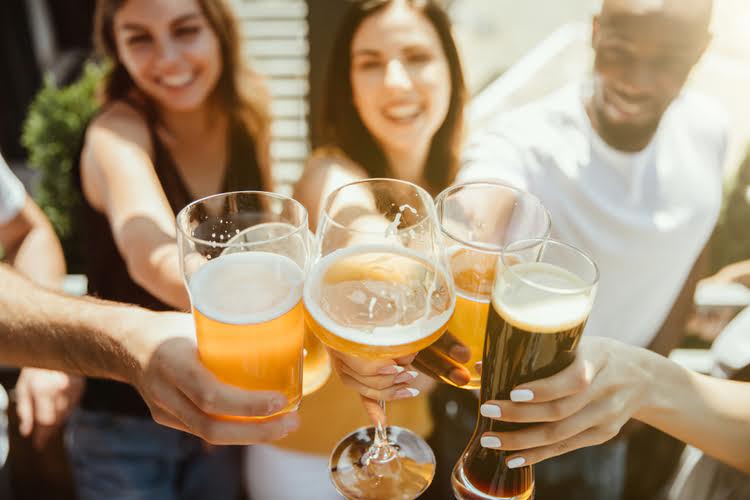Content
Patients suffering from it will live with it for the rest of their lives. There is always a risk of relapse because the brain is permanently wired to crave the substance.
What is the best thing to say to an addict?
Be clear in what you want to communicate to them, and don't hesitate to bring up your own feelings about the situation—in a calm way. In fact, saying how you feel is often a good starting point. Tell your loved one how it hurts and worries you to see them addicted to drugs and how you fear for their safety.
The American Medical Association classified alcoholism as a disease in 1956 and included addiction as a disease in 1987. If we are committed to promoting recovery and really want to help people heal and get better, we need to make a radical shift in the way we regard substance use and addiction. Understanding that addiction is not anyone’s fault is a good step in this direction. Here at Brookdale Premier Addiction Recovery, we understand the complexity of substance use disorder and recognize the need for comprehensive treatment services. Almost anything can potentially lead to an addiction, be it taking drugs, eating, or simply spending time on the internet.
It’s an argument being debated within the medical and neuroscience industries. There are three main camps.
Thus, the requirement that addiction be detectable with a brain scan in order to be classified as a disease does not recognize the role of neuroimaging in the clinic. In his classic 1960 book “The Disease Concept of Alcoholism”, Jellinek noted that in the alcohol field, the debate over the disease concept was plagued by too many definitions of “alcoholism” and too few definitions of “disease” . He suggested that the addiction field needed to follow the rest of medicine in moving away from viewing disease as an “entity”, i.e., something that has “its own independent existence, apart from other things” . Thus, he concluded that alcoholism can simply be defined as changes in structure or function of the body due to drinking that cause disability or death. A disease label is useful to identify groups of people with commonly co-occurring constellations of problems—syndromes—that significantly impair function, and that lead to clinically significant distress, harm, or both. This convention allows a systematic study of the condition, and of whether group members benefit from a specific intervention. In addition, members of the public, who are likely to view addiction as a moral failing, are less likely to support policies that help drug addicts with recovery.
Can addiction happen to anyone?
Addiction can happen to anyone
There is not one single driving factor that leads to addiction. Some people may use drugs to help cope with stress, trauma, or to help with mental health issues. Some may even develop opioid use disorder after misusing opioids they are prescribed by doctors.
Dopamine makes us feel good and want to keep doing what we’re doing. Cues trigger the reward system, fuel cravings and create a habit loop.
Is Addiction a Disease?
This http://www.em-remarque.ru/library/lingvostilisticheskie-parametry-romana-iskra-zhizni.html is also endorsed by Kennett and colleagues, who state that drug use may be an involuntary choice, but only after their self-control resources are exhausted. Not in the literal, metaphysical sense meaning predetermined or necessitated, but definitely in an experiential sense of being subjected to a very strong compulsion that may feel impossible to resist . In short, when discussing control, there ought to be a sole focus on assessable qualities such as impulsivity, understood as the capacity to restrain and inhibit one’s behaviour. By addressing such qualities, empirical studies have aimed to gain insight into the motives and processes underlying control and choice . There is a clear association between addiction and impulsivity, suggesting that addicts have less control over their choices than non-addicted individuals. For instance, most substance use disorders indeed began with a decision .
Secondly, the http://atloc.info/page/2/ of NESARC data omits opioid addiction, which, together with alcohol and tobacco, is the largest addiction-related public health problem in the US . This is probably the addictive condition where an analysis of cumulative evidence most strikingly supports the notion of a chronic disorder with frequent relapses in a large proportion of people affected . Of course, a large number of people with opioid addiction are unable to express the chronic, relapsing course of their disease, because over the long term, their mortality rate is about 15 times greater than that of the general population . For instance, in many countries, the highest prevalence of substance use problems is found among young adults, aged 18–25 , and a majority of these ‘age out’ of excessive substance use .
Where you’ll have your treatment
Residential treatment generally takes courses over a 30-, 60- and 90-day period. Residential treatment, also referred to as inpatient rehabilitation, requires the member to live at our recovery center. These parts of your brain highlight moments that feel good, and they can prompt repeated behavior. When the brain is damaged, people experience an inability to control their impulses, make good decisions, and move forward despite the knowledge of drug’s damaging impact. Those in this group say addictions stem from behaviors, not disease processes. They also say addictions don’t always require treatment for recovery to begin.
How Colorado’s flavored nicotine ban debate raises questions about … – Colorado Public Radio
How Colorado’s flavored nicotine ban debate raises questions about ….
Posted: Sat, 23 Apr 2022 07:00:00 GMT [source]
Addiction is a natural language concept, etymologically meaning enslavement, with the contemporary meaning traceable to the Middle and Late Roman Republic periods . As a scientific construct, drug addiction can be defined as a state in which an individual exhibits an inability to self-regulate consumption of a substance, although it does not have an operational definition. Regarding clinical diagnosis, as it is typically used in scientific and clinical parlance, addiction is not synonymous with the simple presence of SUD.
Addiction relapses are a reality, but not failure
Detoxification is the process your body goes through to get rid of harmful chemicals that were built up over time. In other words, you get to work with a cleaner slate at the beginning of treatment. Afterward, treatment will take place and you’ll have a structured daily schedule of therapies that will teach to maintain long-term sobriety. If we can lay blame for these diseases at the feet of genes, we should be able to do the same for addictions, some experts say. For example, take someone who has received a diagnosis of skin cancer from too much sun exposure. The person could have stayed out of the sun more, but the disease was not the person’s choice. When it is an addiction, a person might have triggers, such as places or interactions linked to their drug use.
Cravings can last for years and feel uncontrollable even if and when the person becomes sober. Several books or articles were provocatively named after previously published well-known entries, such as ‘Addiction is not a brain disease, and it matters’ by Levy as a reply to Leshner’s well-known ‘Addiction is a brain disease, and it matters’. Choices may stem from peer pressure and the desire to deal with negative emotions and stress.
Outpatient treatment is a great option for individuals with a strong, stable support system at home. This allows them to meet with addiction treatment specialists during the day and learn about how healthy coping mechanisms and sobriety. These recovering individuals can then apply what they’ve learned to everyday situations when they return home. The National Institute on Drug Abuse says relapse rates for addiction are similar to those seen in diabetes, asthma, and hypertension.
- What brings us together is a passionate commitment to improving the lives of people with substance use problems through science and science-based treatments, with empirical evidence as the guiding principle.
- What may be less appreciated among scientists is that its impact in the real world of addiction treatment has remained more limited, with large numbers of patients still not receiving evidence-based treatments.
- Once these changes have been made in the brain, cravings for drugs and alcohol develop into almost instinctual compulsions.
- In other words, from our perspective, viewing addiction as a brain disease in no way negates the importance of social determinants of health or societal inequalities as critical influences.
- He tells students that addiction causes chemical changes that hijack your brain.
- While the exact “addiction gene” hasn’t yet been found, researchers have identified clusters of DNA that can influence how strongly drugs work, and that could spark compulsive use.



